Teaching staff
-
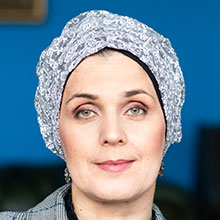 Prof. Dr. Sci. Zilka Spahić Šiljak
Prof. Dr. Sci. Zilka Spahić Šiljak
Prof. Dr. Sci. Zilka Spahić Šiljak, Director of the FER School, is a professor of gender studies who earned her doctorate from the University of Novi Sad in 2007. Her expertise spans gender, religion, human rights, politics, and peacebuilding, backed by extensive experience in both governmental and non-governmental sectors as well as the academic community. From 2011 to 2019, she served as a lecturer and researcher at Harvard University and Stanford University in the United States. Prior to that, she led the Religious Studies program at the University of Sarajevo for six years. Currently, she is the director of the TPO Foundation in Sarajevo, which focuses on education, intercultural dialogue, peacebuilding, and empowering young people and women for leadership. Additionally, she is a visiting professor at Roehampton University in London and teaches at the Faculty of Philosophy at the University of Zenica. Prof. Dr. Sci. Spahić Šiljak has published several books and academic papers. Link to her ResearchGate profile: https://www.researchgate.net/profile/Zilka-Spahic-Siljak -
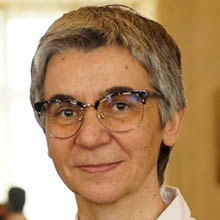 Dr. sc. Jadranka s. Rebeka Anić
Dr. sc. Jadranka s. Rebeka Anić
Dr. sc. Jadranka Sr. Rebeka Anić, Director of the FER School, is a Franciscan Sister and a scientific advisor at the Ivo Pilar Institute of Social Sciences – Regional Center Split. She graduated from the Catholic Faculty of Theology in Zagreb and earned her doctorate from the Faculty of Catholic Theology of the University of Vienna. As an external associate, she has taught at the Department of Sociology at the University of Zadar, the Center for Interdisciplinary Postgraduate Studies (CIPS) at the University of Sarajevo, the Catholic Faculty of Theology in Split, and the University Center for Protestant Theology Matthias Flacius Illyricus in Zagreb.
Dr. sc. Anić has served on the board of directors of the European Society of Women in Theological Research (ESWTR) and has held the positions of president and vice-president of the Croatian section of ESWTR. In 2017, she was awarded a prize by the Herbert Haag Stiftung for Freedom in the Church, based in Switzerland, for her research into gender theories and the anti-gender movement.
Her primary research areas include theological anthropology from a gender perspective, the anti-gender movement, violence against women, and the role of religion in the lives of the homeless and the elderly. You can view the list of her published papers here. -
 Ajla Demiragić
Ajla Demiragić
Ajla Demiragić (born in Mostar in 1976) completed her undergraduate, master’s, and PhD studies at the Faculty of Philosophy, University of Sarajevo. She is currently employed as an associate professor at the same faculty, where she teaches courses in literary theory, feminist, and gender studies within the Department of Comparative Literature and Information Sciences. In addition to her role at her home institution, she has also served as an associate at the Interdisciplinary Postgraduate Gender Studies program at the University of Sarajevo. Demiragić is the author of the book War Counternarratives of Bosnian Women Writers (Zagreb: Institute for Ethnology and Folkloristics, 2018) and has published over twenty scientific and professional papers. Her research interests primarily focus on feminist theories, gynocriticism, storytelling theories, and literary-theoretical and cultural studies of literature. -
 Jasmina Husanović
Jasmina Husanović
Prof. Dr. Jasmina Husanović teaches cultural and gender studies at the University of Tuzla. Her research interests lie in cultural and political theory and practice, with a focus on the politics of testimony, equality and solidarity, the culture of trauma, and emancipatory politics. Her work explores the intersections of cultural production, knowledge production, critical pedagogy, and social activism. She is actively involved in numerous educational, publishing, and civic initiatives and platforms, both regionally and internationally, addressing issues of memory, trauma, violence, equality, solidarity, and social justice. Among her recent publications are the scientific monograph Culture, Community, and Activism in Bosnia and Herzegovina (2020) and the collection of scientific papers Challenges of Integrating Gender Equality in the University Community: Against Gender-Based Violence (2022), which she co-edited. -
 Larisa Kasumagić Kafedžić
Larisa Kasumagić Kafedžić
For the past 25 years, Larisa has been actively involved in peaceful actions, community youth development programs, the philosophy of nonviolence, teacher development, and intercultural pedagogy in language education. She holds an MPS in International Development and Education from Cornell University and a Ph.D. in English Language Pedagogy and Intercultural Education from Sarajevo University. She is an associate professor at the Faculty of Philosophy of the University of Sarajevo. Her research interests are in the fields of intercultural education, peace pedagogy, language education, teacher training, and action research in teacher development. She is the founder and president of the Peace Education Hub established at the University of Sarajevo in early 2020. -
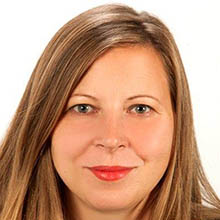 Prof. Dr. Sci. Anja Zalta
Prof. Dr. Sci. Anja Zalta
Dr. Anja Zalta is an Associate Professor of Sociology of Religion at the Department of Sociology, Faculty of Philosophy, University of Ljubljana, Slovenia. She has authored numerous articles on religious traditions and identities, Islam in Slovenia and Europe, interreligious and intercultural dialogue, Asian religious paradigms, and the role of monotheistic religions in European cultural and religious history. In 2013, as a principal investigator on an international project at the University of Istanbul, she examined the rights of religious minorities, with a particular focus on the province of Tur Abdin along the Turkish-Syrian border. Between 2014 and 2015, at the Institute of Nan Tien in Wollongong, Australia, she analyzed the role of socially engaged Buddhism and led a platform for interreligious dialogue. Dr. Zalta is a board member of the Slovenian Sociological Society and serves on the editorial boards of Družboslovne Razprave and Polygraph. She is also a co-editor of the monograph Women Against the War System (Lit Verlag, Zurich, 2017). -
 Adis Đuderija
Adis Đuderija
Adis Duderija is a first-generation Bosnian-Australian. He obtained his Ph. D in 2010 at the Centre for Muslim States and Societies at the University of western Australia on interpretational methodologies of Qur’an and Sunna in Neo-Traditional Salafism and Progressive Islam. He is currently an academic at Griffith University in Brisbane Australia where he teaches courses on Islam and Gender, Islamic intellectual tradition and Islam and Muslims in the West. He is the author of 9 books on various aspects of Islamic intellectual tradition (progressive Islam, Qur’anic hermeneutics, the concept of sunna, maqasid al shari’a, Salafism) and Islam and Muslims in the West and over 100 academic publications on these subjects. -
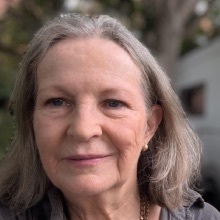 Tina Beattie
Tina Beattie
She left her post as Professor of Catholic Studies at the University of Roehampton in London in 2020 and now works as an independent researcher and writer. She has researched and published extensively on sacramentality, desire, embodiment and gender, engaging with psychoanalytic theory and art history as well as theology in her research. She did her doctoral studies on the Virgin Mary in patristic theology and gender theory. In addition to numerous journal articles and book chapters, her publications include A Theology of Becoming: Body, Blood, Birth, and Sacrament (CUP, forthcoming); Theology After Postmodernity: Divining the Void (OUP 2013); The New Atheists: The Twilight of Reason and the War on Religion (DLT 2008); New Catholic Feminism: Theology and Theory (Routledge, 2006); God’s Mother, Eve’s Advocate: A Marian Narrative of Women’s Salvation (Continuum, 2002). In addition to her academic publications, Tina is a published novelist and a regular contributor to the media, including BBC Radio 4’s “Thought for the Day”. Tina works with academic and educational groups and projects to promote the role of women in church and society. She is President of the Sophia Institute based in Namibia, which offers in-person and online courses in leadership, pastoral formation and theology for women religious in sub-Saharan Africa. She is responsible for developing the theology curriculum, and teaches a one-year online course on “Introduction to Theology”, in the context of African cultures and theologies. -
 Elana Sztokman
Elana Sztokman
Dr. Elana Sztokman (pronounced ee-LAH-nuh STOCK-men, she/her), anthropologist, educator, blogger, podcaster, award-winning author of seven genre-bending books, and feminist activist dedicated to building a more just and compassionate world. As co-host of the podcast Women Ending War, she amplifies the voices of women dedicating their lives to peace and justice. Following a winding journey – physical and spiritual – from Orthodox Jewish Brooklyn through Jerusalem, India, Australia, various religious denominations, experiments with political and spiritual ideologies Elana’s career spans over three decades of education, exploration, and grassroots activism. She uses scholarship, storytelling, and creativity to challenge systems of violence, patriarchy, and inequality and to advance empathy, inclusion, and justice, and especially the leadership of women. Learn more about Elana on her Author page or follow her on Substack -
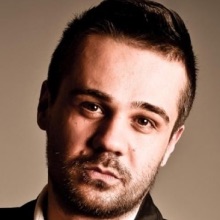 Hazim Begagić
Hazim Begagić
Dr. Begagic is a producer, university professor, and researcher in the field of performing arts and cultural policy. He graduated from the Academy of Performing Arts (Theatre, Film, Radio, and TV) and completed his postgraduate studies at the universities of Sarajevo (Bosnia and Herzegovina), Bologna, and Siena (Italy). He earned his PhD at the University of Zagreb in performing arts and film studies. He served as the director of the Bosnian National Theatre Zenica and the International Festival of Bosnian-Herzegovinian Drama (2010–2020), as well as the leader and chief producer of over 100 artistic projects and international co-productions. He has participated as a jury member and programmer at numerous theatre and film festivals in the region. He completed a one-year professional development programme at Florida State University and a three-year programme at the DeVos Institute of Arts Management and Production in Washington, D.C. (USA). He is the author and co-author of a significant number of scholarly papers, publications, and strategic documents in the fields of arts production, cultural policy, management, and creative industries. He is currently employed at the Faculty of Philosophy at the University of Zenica, where he leads the Cultural Studies program and serves as the head of the Department for Cultural and Tourism Studies. -
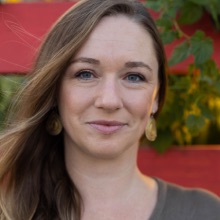 Marie Berry
Marie Berry
Dr. Marie Berry is a feminist sociologist whose research and writing focuses on gender, violence, and social movements. She is an Associate Professor at the Josef Korbel School at the University of Denver, and the Director of the Inclusive Global Leadership Initiative (IGLI), an effort to elevate and amplify the work that women activists are doing at the grassroots to advance peace, democracy, and human rights across the world. Her award-winning book, War, Women, and Power: From Violence to Mobilization in Rwanda and Bosnia-Herzegovina (Cambridge University Press 2018), examined the impact of mass violence on women’s political mobilization in Rwanda and Bosnia. Together with Dr. Milli Lake (LSE), she runs the Women’s Rights After War Project. She is a 2021 recipient of a National Science Foundation CAREER Award and a 2025 recipient of a Presidential Early Career Award for Scientists and Engineers (PECASE). -
 Selina Palms
Selina Palms
She holds a PhD in Theology and Development from the University of KwaZulu-Natal, along with Master’s degrees in systematic theology and human rights. With over seventeen years of leadership in projects across Africa, Asia, and Europe, she has worked extensively with NGOs and faith-based institutions. As a liberation theologian and feminist researcher, her work explores the complex intersections between religion and violence. Currently a Research Fellow at the Unit for Religion & Development Research at Stellenbosch University’s Faculty of Theology, Dr. Palm leads research, education, and consulting initiatives for a wide range of global organizations. She is recognized as an expert in the fields of faith, development, and violence, particularly in relation to vulnerable children. Her consultancy-based research supports faith institutions, NGOs, and governments at local, national, and international levels. In addition to her academic and professional work, she is a lay leader at Rondebosch United Church in Cape Town, where she focuses on developing innovative pedagogies for social justice. -
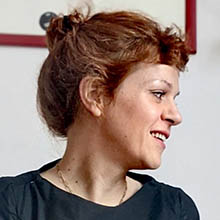 Adriana Zaharijević
Adriana Zaharijević
Adriana Zaharijević is a Senior Research Associate at the Institute for Philosophy and Social Theory, University of Belgrade. She holds a degree in Philosophy from the Faculty of Philosophy in Belgrade and completed her advanced studies at the Faculty of Political Sciences, where she integrated political philosophy with feminist theory and social history. Since 2003, she has been a member of the Association of Literary Translators of Serbia. Zaharijević publishes in both Serbian and English, and her work has been translated into several European languages. Her books include Becoming a Woman (RŽF 2010), Who is the Individual? Genealogical Questioning of the Idea of a Citizen (Karpos 2014, 2019), and Life of the Body: The Political Philosophy of Judith Butler (Academic Book 2020), for which she received the “Anđelka Milić” award. -
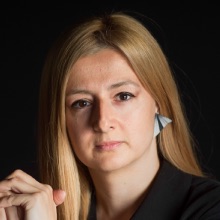 Jelena Ćeriman
Jelena Ćeriman
Dr. Ćeriman is a Research Fellow at the Institute for Philosophy and Social Theory, University of Belgrade. Ćeriman combines theoretical approaches from political and cultural sociology and critical gender studies with both qualitative and quantitative research methods. Jelena conducted her postdoctoral research in Budapest (Institute for Minority Studies – Center for Social Sciences of the Hungarian Academy of Sciences in 2022) and in Ljubljana (ZRC SAZU in 2023). She was also awarded a fellowship for engaged research (2022/23), supported by the Talloires Network of Engaged Universities and the Open Society University Network (OSUN). Within this program, she investigated the realization of collective rights of national minorities in Serbia. She has served as a coordinator of the Serbian team within the Disobedient Democracy (DisDem) project and currently leads an international task group responsible for specific activities within a work package of the CircleU European University Alliance. Her research findings have been recognized as relevant to public policy development, with some incorporated into national strategies in Serbia. She has published in numerous peer-reviewed journals and edited volumes and is actively engaged as a mentor and reviewer in both national and international academic contexts. -
 Anita Dremel
Anita Dremel
Anita Dremel graduated in Sociology and English Language and Literature (2006) and in Japanese Studies (2007). She earned her Ph.D. in Social Sciences with a focus on Sociology (2014) from the Faculty of Philosophy in Zagreb. She is currently an Associate Professor and the Head of the Department of Sociology at the Faculty of Philosophy in Osijek, where she teaches eight courses. Additionally, she serves as the Chair of the University Commission for Gender Equality.Anita Dremel is actively involved in scientific projects and publishes research papers both in Croatia and internationally. (For a list of her publications, see her profiles on CRORIS and Google Scholar). She is a member of the program committee for international scientific conferences and is actively engaged in the work of the Center for Women’s Studies in Zagreb. Furthermore, she is the Chief Editor of the Review of Sociology. Her research interests include sociological theory, and the sociology of culture, gender, and art. -
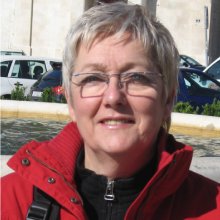 Inga Tomić-Koludrović
Inga Tomić-Koludrović
Prof. Dr. Sci. Inga Tomić-Koludrović, Professor Emerita at the University of Zadar and the Ivo Pilar Institute of Social Sciences, earned her Master’s degree in the Sociology of Culture from the University of Ljubljana and her Ph.D. in the field of Lifestyles from the University of Zagreb. Her research interests and publications focus on gender, women, inequalities, youth, and modernization. She has authored eight books and over 70 scientific and professional papers. Prof. Tomić-Koludrović has taught at the undergraduate, master’s, and doctoral levels at several universities, including the University of Bologna, the University of Teramo, Karl-Franzens University of Graz, the University of Zagreb, and the University of Zadar. She has received numerous awards for academic excellence, including the Annual State Award for her book Moving Towards Modernity: Women in Croatia during the Period of “Mature” Transition (2016) and the Rudi Supek Award from the Croatian Sociological Society for significant achievements and contributions to the development of sociology (2019). She has led national sections of several international research projects, including those funded by US Aid, the EU FP5, the Swiss National Science Foundation (SNSF), and the EU Horizon 2020 program. Prof. Tomić-Koludrović has also conducted scientific training as a Fulbright scholar at prestigious American universities, including the Massachusetts Institute of Technology and Boston College (2003-2004), as well as at Karl-Franzens University of Graz (2012, 2020-2021). Link to her personal profile on the Croatian Scientific Bibliography (CRORIS): https://www.croris.hr/osobe/profil/6505 -
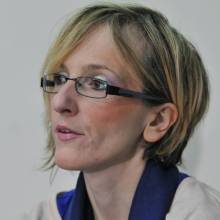 Zlatiborka Popov – Momčinović
Zlatiborka Popov – Momčinović
Zlatiborka Popov – Momčinović (born in 1975) is an Associate Professor of Political Science at the University of East Sarajevo. She earned her Ph.D. from the Faculty of Political Sciences in Belgrade with a dissertation titled “The Women’s Movement in Post-Dayton Bosnia and Herzegovina: Achievements, Initiatives, and Controversies”. Her research interests include the women’s movement and activism, gender mainstreaming policies, peacebuilding, and reconciliation, with a particular focus on gender and religious perspectives. She has published over 80 scholarly papers and monographs, including Religious Tolerance in Bosnia and Herzegovina (co-authored), The Women’s Movement in Bosnia and Herzegovina: Articulation of a Counterculture, and Women and the Processes of Reconciliation in Bosnia and Herzegovina: Challenging Gender Roles, Established Narratives, and Performative Practices with Reference to Religion. Since 2012, she has been involved in the research project Religion and Ethics in War and Peace, conducted by the Center for Empirical Research of Religion in Novi Sad and the University of Edinburgh. Additionally, she is a member of the Political Science Committee of the Academy of Sciences and Arts of Bosnia and Herzegovina. She speaks English and German and has a working knowledge of French. -
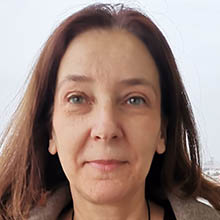 Suzana Vrhovski Peran
Suzana Vrhovski Peran
Suzana Vrhovski Peran is an Assistant Professor in the Department of Communication at Croatian Catholic University. Her research interests include the family and media, media credibility, the representation of women in the media, religious topics in the media, the relationship between the Church and the media, and media literacy. She also teaches media-related subjects across various programs at the University of Zagreb. An accomplished author and editor, she has written several books and numerous scholarly articles. Additionally, she has extensive experience as a journalist and editor, and she currently serves as the President of the Croatian Society of Catholic Journalists. -
 Irena Sever Globan
Irena Sever Globan
Irena Sever Globan is an Associate Professor in the Department of Communication at the Croatian Catholic University in Zagreb, where she teaches courses in interpersonal communication, film art, media theories, and international communication. She earned her theology degree from the Catholic Faculty of Theology in Zagreb and completed both her undergraduate and doctoral studies in communication at the Pontifical Salesian University in Rome. Her teaching experience includes positions at the Department of Cultural Studies at J. J. Strossmayer University in Osijek, the Faculty of Croatian Studies at the University of Zagreb, the Department of Communication at the University of Dubrovnik, and the Philosophical-Theological Institute of the Society of Jesus in Zagreb. Her research interests encompass gender representation in the media, the relationship between religion and culture, and film art. She is a member of the Society for Communication and Media Culture (DKMK), the Center for Nonviolent Communication Croatia (CZNK), and serves as the vice-president of the Croatian section of the European Society of Women in Theological Research (ESWTR-CS). -
 Ksenija Magda
Ksenija Magda
Ksenija Magda is an Associate Professor of Biblical Theology at the University Center for Protestant Theology Matthias Flacius Illyricus at the University of Zagreb. She completed her theological studies at the Evangelical Theological Seminary in Osijek and earned her doctorate from Brunel University (London School of Theology) in London. Her academic research focuses on New Testament exegesis, with particular emphasis on contextual and feminist interpretations of the Bible. Since 1994, she has addressed issues related to women in the church and society, initially within ecclesiastical contexts. Over the years, she has participated in several national and international working groups and commissions dedicated to women’s issues in both society and the church. From 2015 to 2020, she served as the President of the Women’s Ministry of the Baptist World Alliance, based in Washington, D.C. She is currently the President of the Croatian section of the European Society of Women in Theological Research (ESWTR-CS). A list of her significant works can be found on her CROSBI profile: https://www.bib.irb.hr/profile/25143 . -
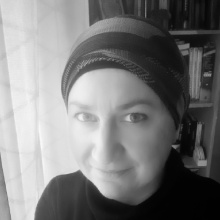 Merima Jašarević
Merima Jašarević
Merima Jašarević is an Associate Professor of Sociology at the Faculty of Education, Department of Sociology, at the “Džemal Bijedić” University in Mostar. She earned her PhD from the University of Sarajevo, with a dissertation on the sociological understanding of new trends in art in Bosnia and Herzegovina during the second half of the 20th century. Dr. Jašarević teaches several subjects, including Sociology of Culture and Art, Sociology of Settlements, Sociology of Marriage and Sexuality, Cultural Theories, and Sociological Theories. From 2014 to 2020, she served as the head of the Department of Sociology at the Faculty of Education in Mostar and was also the coordinator of various research projects. She is a co-author of the book Culture and Youth (2018) and serves as the editor-in-chief of Educe, a journal focused on education, science, and culture. Dr. Jašarević has published numerous scientific papers on topics related to mass media, culture, and education. Her research also includes an examination of feminist concepts and activities within the public discourse of Bosnia and Herzegovina. -
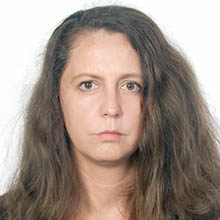 Milena Karapetrović
Milena Karapetrović
Milena Karapetrović is a professor at the Faculty of Philosophy at the University of Banja Luka, where she completed her doctoral dissertation in philosophy in 2009. She teaches courses in Ontology, Pragmatist Philosophy, Feminist Philosophy, Democracy and Human Rights, Philosophy of Gender and Media, and Gender, Identity, and Development. In addition to numerous scholarly and professional papers, she has authored several books, including Female Philosophers (2020), Philosophy in the Digital Age (2020), In the Labyrinths of Being (2014), Longing for Europe: Philosophical Foundations of the Idea of Europe and European Identity (2010), and She Has a Name: On Philosophy and Feminism (2007). She is a member of the International Association of Women in Philosophy and has participated in educational and scientific conferences both in Bosnia and Herzegovina and internationally. Since 2020, she has been leading the Institute for Humanities and Social Sciences at the Faculty of Philosophy, University of Banja Luka. -
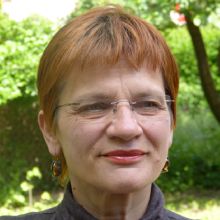 Ana Marija Raffai
Ana Marija Raffai
Ana Marija Raffai (born 1959) is a peace activist, Catholic theologian, and professor of French and German. In 1991, she completed her theology degree with a thesis on the feminist theologian Katarina Halkes. As a feminist theologian, she collaborates with organizations advocating for women’s human rights. In 2016, she earned her doctorate with a focus on nonviolence in the liberation theology of Dorothea Soelle. Since 1996, she has served as a trainer for non-violent action with the RAND association. She is a council member of the Women’s Ecumenical Initiative and a member of the Croatian branch of the ESWTR society. Raffai coordinates the Believers for Peace initiative, which has organized four regional conferences on “Building Peace, Glorifying God” since 2006. Since 2019, she has been involved in developing non-violence policy institutions. Along with Otto Raffai, she regularly writes the “Revolution of Gentleness” column on the autograf.hr portal to promote non-violent action. She has published several manuals and articles in Croatian, German, and French. Together with her husband, she received the International Reconciliation Movement’s Peace Award in 2003 and the Kruno Sukić Award for the Promotion of Peacemaking, Nonviolence, and Human Rights in 2012. She is also the mother of three children. -
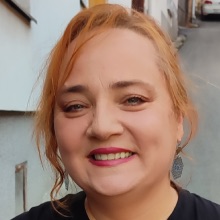 Amra Pandžo
Amra Pandžo
Amra Pandžo earned her PhD from the Faculty of Political Sciences at the University of Sarajevo, specializing in Security and Peace Studies. For more than twenty years, she has been actively engaged in peacebuilding, fostering trust, and supporting social recovery in post-war Bosnia and Herzegovina, guided by the values of Islam as well as universal principles of humanity and justice. She has taught courses such as Religion, Violence and Conflict Resolution and Religion and Social Justice at the University of Sarajevo, and also gained teaching experience at the University of Zurich in Switzerland.In a survey conducted by the TPO Foundation, she was recognized as one of eleven women who made a significant contribution to peacebuilding in post-war Bosnia and Herzegovina. She has shared her expertise with communities in Kosovo, Ukraine, and Afghanistan, participating in reconciliation and dialogue processes. Currently, she serves as the director of the Association for Dialogue in Family and Society “Small Steps”. She is the author of a teaching manual for Islamic religious education instructors on the peace dimension of Islam, as well as the books The Path of Peace: Peacebuilding and Islam in Bosnia and Herzegovina.
-
 Randall Puljek-Shank
Randall Puljek-Shank
Dr. Randall has more than 25 years of experience in peacebuilding in programme design, implementation, training, evaluation, and research with a primary focus on the Western Balkans. He worked with the NGO Mennonite Central Committee from 2002 to 2012, supporting local organisations focused on strategic peacebuilding, inter-religious action, and trauma healing. His recent work includes program evaluations of Initiative of Change’s Trustbuilding Programme, MCC’s program in Colombia and Ecuador, the Interpeace Peace Responsiveness Program and forumZFD’s Western Balkans Program and leading a team of researchers conducting a collaborative study Improving Your Programmatic Learning Journey: A Resource Guide for HDP Nexus Practitioners. As a facilitator and process design consultant he has worked for Transparency International, IOM and Helvetas. He also designed and facilitated five exchanges for selected government and NGO participants from Ukraine to learn from the experience of Bosnian practitioners. Randall holds a PhD in Political Science from the Radboud University Nijmegen. His doctoral research deepened his interest in the intersection of civil society and politics of ethnically divided societies, and his research has been published in the journals Cooperation and Conflict, Democratization and Voluntas. He has taught undergraduate political science, social movements and graduate capacity building, programme planning, monitoring, and evaluation, and peacebuilding theory. -
 Sabiha Husić
Sabiha Husić
Dr. Sabiha Husić is a psychotherapist, an advocate for interreligious peace, and the director of the NGO “Medica” Zenica in Bosnia and Herzegovina (BiH). In 2019, she earned her Doctorate in Gender Studies from the Center for Interdisciplinary Studies at the University of Sarajevo. Her doctoral thesis was titled “Critique and Transformation of the Model of Social Support for Survivors of Sexual Violence in War in Bosnia and Herzegovina: Feminist and Cultural Perspectives.” Dr. Husić completed her professional development through the Specialist Studies in International Education program in Brattleboro, Vermont, USA, which she finished in 2003. She has received several awards for her work, including the “Peacemaker Award” from the Joan B. Kroc Institute for Peace & Justice at the University of San Diego, USA (2013), and the “Women of the World” award for her exceptional leadership and unwavering dedication to helping women and children who have survived war and post-war violence in BiH. -
 Medina Mujić
Medina Mujić
Dr. Medina Mujić holds a PhD in the humanities with a specialization in communication studies. She has published numerous academic and professional papers in Bosnia and Herzegovina and across Europe, focusing on gender equality, the position of women in both public and private spheres, and power dynamics within academic institutions and public life.Her academic interests include gender studies, media reporting, gender representation in public discourse, and mechanisms for reproducing patriarchal roles through media and tradition. For over fifteen years, she has actively collaborated with civil society organizations, dedicating herself to the protection of women’s human rights and education in the fields of gender-based violence and partner relationships. She is the author, co-author, editor, and reviewer of numerous publications and collections in the area of human rights.
-
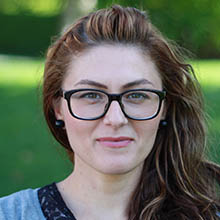 Amina Selimović
Amina Selimović
Amina Selimović is an associate professor and doctoral researcher at the Faculty of Theology, University of Oslo. Her research focuses on Islamic feminism and contemporary Islamic thought. She teaches courses on Islam and gender, Islamic ethics, Islam in Europe, interreligious dialogue, and interreligious theology. Beyond her academic work, she is actively involved in politics and volunteering and contributes to public discourse as an author and lecturer. -
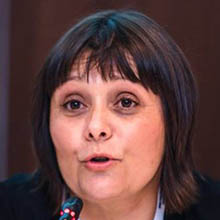 Zorana Antonijević
Zorana Antonijević
She earned her Ph.D. in Gender Studies from the University of Novi Sad, focusing on the gender mainstreaming of family support policies within the context of European integration in Serbia. From 2009 to 2021, she served as a Gender Equality Advisor for the OSCE Mission. Prior to this role, she provided gender equality expertise to various international organizations, civil society groups, and public administration entities. Notably, she was the first gender equality advisor in the provincial government and also founded and directed the Institute for Gender Equality within the Government of Vojvodina. She has edited numerous publications on gender equality in the security sector, gender-responsive budgeting, and gender mainstreaming. Since 2017, she has been a guest lecturer at the Faculty of Political Sciences in Belgrade, where she teaches the course “Gender and Security” as part of the International Security Master’s program. Her research interests include the institutionalization of feminist theories and practices, public policies related to care and security, and the theoretical and practical implications of gender mainstreaming in public policies in Serbia and the broader region. -
 Julijana Mladenovska-Tešija
Julijana Mladenovska-Tešija
Julijana Mladenovska-Tešija is a philosopher and theologian of Macedonian-Croatian descent, residing and working in Osijek since 2005. She is currently in the final stages of completing her doctoral dissertation in the fields of philosophy, religion, and peace at the University of Utrecht in the Netherlands. For her doctoral research, she was awarded the prestigious IPRAF scholarship for the 2019-2020 academic year. She earned her undergraduate degree in philosophy from the University of Skopje, a master’s degree in theology from the Evangelical Theological Seminary in Osijek, and specialized in human rights and conflict resolution at the University of Oslo and Nansen Academy in Lillehammer, Norway. Additionally, she studied public relations at the London School of Public Relations. Since 2007, she has served as a lecturer in philosophical subjects at the Evangelical Theological Seminary and has managed EU projects, working closely with civil society and religious communities. She is also a member of several organizations and has been serving on the Committee for Human and Minority Rights of the City of Osijek since 2021. Julijana Mladenovska-Tešija is the author of numerous professional works. Her research interests include religion, human and minority rights, gender equality, non-violence, and activism. -
 Elma Softić-Kaunitz
Elma Softić-Kaunitz
Elma Softić-Kaunitz graduated from the Faculty of Philosphy at the University of Sarajevo and holds MA in Religious Studies. She has served as General Secretary of the Jewish Community of Bosnia and Herzegovina, the Jewish Community in Sarajevo, and La Benevolencija since 2005. With over 30 years of professional experience, she is a teacher of philosophy and literature by profession and holds a Master’s in Religious Sciences from the University of Sarajevo. Her research focuses on interfaith dialogue, gender, culture, and education, with a particular interest in the contributions of Jewish women in the Balkans.She is the author of Sarajevo Days, Sarajevo Nights, published in multiple languages and adapted for stage and radio performances in Toronto, Atlanta, and Chicago. Elma co-authored two short story collections with Pavle Kaunitz: Nira’s Challenges and Everything We Do (Not) Want to Know.
In addition to her books, she has written numerous articles for Jevrejski glas, the journal of the Jewish Community of Bosnia and Herzegovina, and other publications. She was also one of the editors of the first ten programs of Radio La Benevolencija, broadcast in 1994, which marked the beginnings of the station’s cultural and educational engagement.
She has contributed to feminist and religious studies as a lecturer at the FER School, University of Sarajevo, and has published widely on women’s history, education, and interreligious dialogue.
-
 Melika Šahinović
Melika Šahinović
Melika Šahinović holds a Master’s degree in International and Public Relations and is a researcher, author, and co-author of several publications focused on education, gender equality, and the promotion of peace within a pedagogical framework. With over fifteen years of experience in the civil sector, her work encompasses human rights, international law, gender equality, and the political empowerment of youth. She places significant emphasis on integrating formal and informal education and is a certified Trainer of Trainers (TOT) by the SAPERE Institute UK for the P4C (Philosophy for Children) program in the Western Balkans. Currently, she serves as a project manager, overseeing EU IPA projects in Bosnia and Herzegovina and the wider region. -
 Aneta Jovkovska
Aneta Jovkovska
Aneta Jovkovska is a scholar specializing in contemporary issues such as education, religion, spirituality, interreligious dialogue, human rights, and peacebuilding. With over ten years of experience in academic teaching and the non-governmental sector, she brings extensive expertise to her work. She is a member of the Alumni Association and serves as an assistant professor at the Faculty of Orthodox Theology in Skopje, Republic of North Macedonia. There, she teaches courses in Christian Pedagogy, the Methodology of Religious Education, and the History of Religions. Dr. Jovkovska has also published numerous articles in both English and Macedonian. -
 Lana Bobić
Lana Bobić
Lana Bobić is a theologian, feminist, and activist, born in Zagreb in 1985. She completed classical high school and earned both her undergraduate and graduate degrees in theology at the University Center for Protestant Theology Matthias Flacius Illyricus at the University of Zagreb. Additionally, she completed Peace Studies at the Center for Peace Studies. Her research focuses on issues such as structural violence, gender-based violence, the dynamics of domination and subordination, and the role and status of women in the Church. Her academic interests lie in feminist theology, particularly feminist critical theory in religion. In 2012, she began working as an external collaborator on the Face to Face campaign for the Autonomous Women’s House Zagreb (AŽKZ), and from 2015 to July 2017, she worked continuously for AŽKZ. Since late 2016, she has been leading the “In Good Faith” initiative, and since 2018, she has served as the Executive Director of the In Good Faith Association. She is also a member of the Gender Equality Commission of the City of Zagreb. Lana is a columnist for the Lupiga portal and a commentator for the show Peti dan (The Fifth Day) on Croatian Radio and Television. As an activist, she has long advocated for human rights and gender equality. She collaborates with numerous feminist organizations and initiatives, and she is involved in organizing protests, campaigns, actions, and performances related to gender-based violence and gender equality issues. Lana frequently participates in both international and domestic events concerning human rights, the fight against gender-based violence, gender equality, peace work, and the dialogue between secular and religious perspectives. She also occasionally conducts workshops and lectures on gender-based violence and gender equality.
